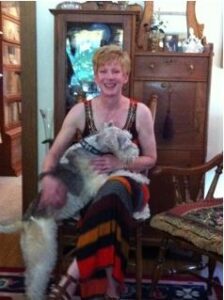 A week ago, we had to let go of our dog Ralph.
A week ago, we had to let go of our dog Ralph.
You may remember him from “Communication Lessons from My Dog Ralph” in May (https://www.yourwordsmith.com/what-can-my-dog-ralph-teach-you-about-communication).
Since his sudden loss, I’ve been thinking about ways to become the person Ralph imagined I was. Doing a better job of saying “thank you” seems a good start.
The Best “Thank You” Never Heard
How many times have you thanked someone this week? And how many times did you really mean it?
The Yawn-Inducing “Thank You”
When I first had an assistant, in the days before email, I gave her handwritten notes with instructions. Each one ended with “thank you” above my signature. I told myself this expressed an appreciation of her work.
One day, I overheard her mentioning this practice to another assistant. “Lynne thanks me for everything,” she said. “Because it happens so often, it’s meaningless to me.”
I was shocked. Then I realized that my thanks were more about me wanting to be a good, polite person rather than offering this woman a sincere compliment. Ouch!
If you just thank someone, it’s transactional. “You did something nice for me, so I’ll say something polite to you.” This doesn’t touch the other person or strengthen your relationship.
A Power Thank You
When it’s a big deal, we need to take the extra step to generate strong feelings of gratitude, respect and affinity with the other person. Mark Goulston calls this the “power thank you.” It has three parts:
- Thank the person for something specific that he or she did.
- Acknowledge the effort it took for the person to do this: “I know you didn’t have to …” or “I know you went out of your way to …”
- Tell the person the difference that his or her act personally made to you.
What happens when someone performs an extraordinary act of kindness and all he hears is “Thanks”? He isn’t getting back as much as he put in – and feels unappreciated. Power thank yous also make you look good. They show you have empathy and humility, and that you really care. So do this in a group setting wherever possible – to reward the giver and receiver.
Thank You, Ralph
Thank you for our final walk last Monday, Ralph.
You hadn’t eaten much for the last few days, and the cancer I now know you had was sapping your strength. But you trotted gamely by my side, as though nothing was wrong. All I felt was how happy you were to be with me in the sunshine.
You made me want to be a better person. To stop getting apoplectic when someone cuts me off in traffic; instead, to take a deep breath and let it go. To support people with a sympathetic ear when they lose someone they love. To look for ways to intentionally thank others for their kindness.
I’m grateful for the blessing you have been in my life – and wish I had told you that more often.
